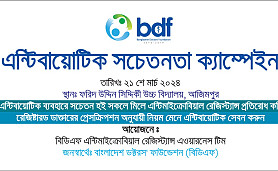Our food habit has a great impact on our heart's health. Heart-friendly eating
habit can help prevent and manage high blood pressure, high cholesterol, or
heart failure. If a person is worried about heart disease, one of the most
important things he can do is to start eating a heart-healthy diet.
* Stay away from extra oil: Whatever the source only 3-4 teaspoon of cooking
oil per day is recommended for a healthy people. There is nothing to convince
yourself, for instance, olive oil is good or soybean oil is bad.
* No extra salt: Though sodium (table salt) is good, less is best for health. Extra
salt is a big risk factor for high blood pressure which, in turn, increases the risk of
heart disease. Therefore, it is better to choose and prepare foods with little or no
salt.
* Eat more fruits and vegetables: Eat a variety of fruits and vegetables prepared
with very little cooking oil and no extra salt. Dark green, deep orange and yellow
fruits and vegetable are especially good for the heart.
* Eat a variety of fibres or grain product daily: Include whole-grain foods such
as cereals, oats, whole wheat bread and brown rice which contain lots of fibres
and nutrients. All these help in reducing bad fat in the blood.
* Cut back on red meat and source of bad cholesterol (LDL): Avoid all kind of
red meats (like beef, mutton, bacon, lamb), animal fat, prawn, egg-yolk etc. These
fats and cholesterol-enriched indeed increase the blood cholesterol level which is
dangerous for the heart. Rather, chicken and fish can be preferred as a regular
meal which meets the daily protein as well. Nevertheless, eating smoked and
fried chicken can't be recommended.
* Eat fishes regularly: Eat small fishes as well as sea-fishes as much as you can.
Oily sea-fishes like hilsa, salmon, tuna, mackerel, sardines are rich in Omega-3
fatty acid which is a very good friend for your heart.
* Say no to sugar: Sugar is the most vulnerable silent killer for a person. Studies
show sugar is even more dangerous than animal fat as sometimes fat is not
absorbed fully from intestine whereas sugar after fully being absorbed extra
portion is converted into fat and deposited in different organ as well as vessels
that lead to heart disease.
During the first few days, it may seem like there is a lot to adapt. There is nothing
to be worried about, start with some small steps. Over time, making a number of
small changes can add up to a big difference of your heart and health.
Lecturer
Department of Pharmacology & Therapeutics
Popular Medical College, Dhaka.





